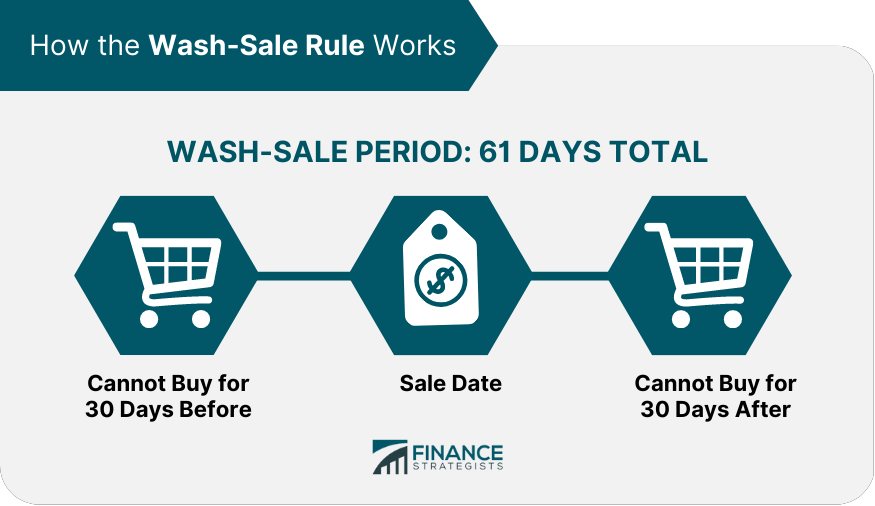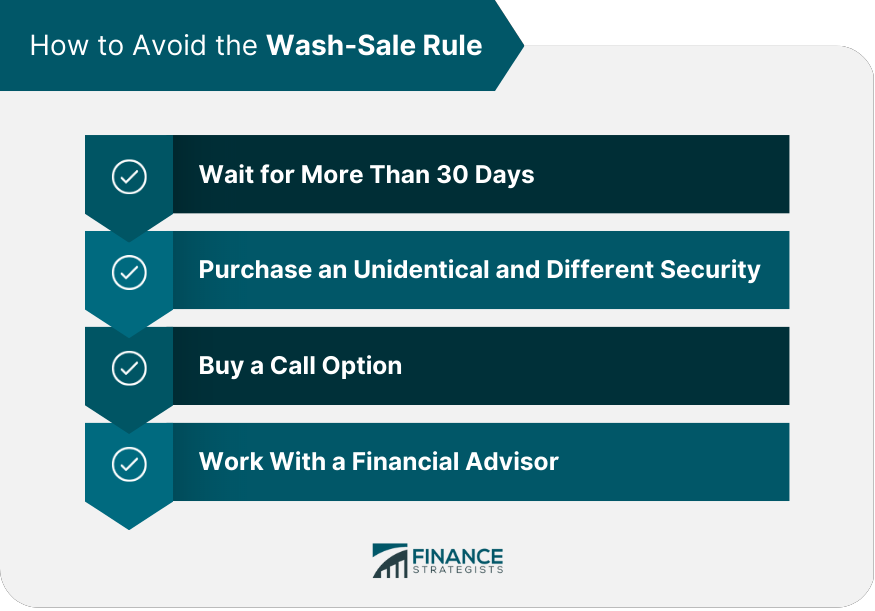The wash-sale rule is a tax regulation that aims to prevent investors from selling securities at a loss and then repurchasing the same or a substantially identical security in a span of 30 days before or after the sale, in order to realize a capital loss for tax purposes. This rule is unique from other tax regulations in that it disallows a loss deduction under certain circumstances rather than imposing a tax. The key elements of the rule include the requirement that the security sold and the security repurchased are substantially identical. Another important element is that the sale and repurchase occur within the 30-day period. The rule also applies to securities purchased by a spouse, a corporation controlled by the investor, or a partnership in which the investor is a partner. The purpose of the wash-sale rule is to prevent taxpayers from using artificial transactions to create tax deductions. The rule is relevant to investors because it can affect the amount of capital gains or losses that they report on their tax returns. In the event that an investor sells a security at a loss and repurchases it within a 30-day period, the loss becomes ineligible for deduction, and the cost basis of the repurchased security is altered to factor in the loss that was disqualified. Selling security at a loss and buying it again within 30 days triggers the wash-sale rule, and the loss deduction is disallowed. The cost basis of the repurchased security is then adjusted to reflect the disallowed loss. The Wash-sale rule applies within a 61-day timeframe, which includes 30 days before and after the sale transaction. Once this period ends, the rule will no longer apply to the same or similar security transactions. The loss can be claimed on their tax return if the investor repurchases the security outside the wash-sale period. It is important to note that the wash-sale rule applies not only to the security that was sold, but also to substantially identical securities. Substantially identical security is one that is substantially similar in its nature, price, and marketability to the security that was sold. Selling shares in one mutual fund and purchasing another mutual fund that tracks the same index may be considered substantially identical. The wash-sale rule also applies to securities purchased by a spouse, a corporation controlled by the investor, or a partnership in which the investor is a partner. IRA transactions can also trigger the wash-sale rule. When an investor sells shares in a non-retirement account and then purchases substantially identical shares in an IRA in 30 days, the investor is not allowed to claim tax losses for the sale, and the loss cannot be deferred by increasing the cost basis of the purchase. Consider an individual who has 650 loss-generating shares of Graphene Steel, Co. that was bought at $40/share, and he wants to sell them at $25/share to take a deduction for the loss. About 15 days after the sale, he hears some good news about Graphene Steel, Co. He buys back 500 shares at $30. Even though he experienced a loss of $15 per share, he is not permitted to claim the loss since it was repurchased during the wash-sale period. Additionally, due to the occurrence of a wash-sale, the investor must increase the cost basis of the repurchased shares by $15/share, resulting in a new cost basis of $45/share. Investors who violate the rule are disallowed to deduct any losses incurred during the transaction for tax purposes. Also, the cost basis of the security is adjusted accordingly. The investor cannot use the loss to offset capital gains and must pay taxes on the gains. An individual who owns 100 shares of EXP Company, bought for $10,000 and now worth $7,350, may want to claim a $2,650 loss on their tax return. They sell their original shares for $7,350 and repurchase a new position for the same amount within the wash-sale period. This triggers a wash-sale. As a result, they cannot claim the $2,650 loss on that year's tax return. Furthermore, if the investor violates the wash-sale rule repeatedly, the Internal Revenue Service (IRS) may view it as a form of tax evasion and impose penalties. The wash-sale rule can be a complex issue for investors who want to reduce their tax liability. Here are some strategies that investors can use to avoid violating it: The simplest way to avoid violating the wash-sale rule is to wait at least 30 days before repurchasing the same or a substantially identical security. This way, the investor can claim the loss on their tax return without triggering the wash-sale rule. Instead of repurchasing the same security, investors can purchase a similar security that is not considered substantially identical to the original security. This way, they can still maintain exposure to the market without triggering the wash-sale rule. Buying a call option instead of purchasing the actual security allows investors to stay in the market while avoiding the wash-sale rule, since the purchase of the call option is not considered a purchase of the underlying security. Investors who are unsure about how to navigate the wash-sale rule can work with a financial advisor. A financial advisor can provide guidance on tax-efficient investing strategies and help investors avoid costly mistakes. The wash-sale rule is a tax regulation that prevents investors from claiming tax deductions on securities sold at a loss and bought again within 30 days. The rule is unique in that it disallows a loss deduction under certain circumstances, rather than imposing a tax. The purpose of the rule is to prevent taxpayers from using artificial transactions to create tax deductions, and it is relevant to investors because it can affect the amount of capital gains or losses that they report on their tax returns. Wash-sale rule violations can have severe consequences. The losses incurred in the transaction are not tax-deductible, and the security's cost basis is adjusted. Thus, investors cannot use the loss to offset capital gains and must pay taxes on them. In order to avoid violating the wash-sale rule, investors can wait for 30 days before repurchasing a security or purchase a similar but not substantially identical security. They can also buy a call option or hire a financial advisor to navigate the complex rule.What Is the Wash-Sale Rule?
How Does the Wash-Sale Rule Work?

Practical Example of Wash-Sale
Consequences of Wash-Sale Rule Violation
How to Avoid the Wash-Sale Rule

Wait for More Than 30 Days
Purchase an Unidentical and Different Security
Buy a Call Option
Work With a Financial Advisor
Final Thoughts
Wash-Sale Rule FAQs
You can wait for 30 days before repurchasing a security or purchase a similar but not substantially identical security. You can also buy a call option or get help from a financial advisor to navigate the complex rule.
There is no penalty for violating the wash-sale rule, but any losses from the sale of a security that trigger the wash-sale rule cannot be claimed for tax purposes. Additionally, the cost basis of the new security purchased to replace the one sold is adjusted to reflect the disallowed loss, potentially increasing the amount of capital gains that would be subject to taxes when the new security is eventually sold.
It can impact tax liabilities, and violating the rule can result in the disallowance of losses for tax purposes and adjustment of the cost basis of the security, which can lead to increased tax liability.
The purpose of the wash-sale rule is to prevent investors from selling securities at a loss for tax purposes while still maintaining their original investment position. The rule prevents investors from unfairly reducing their tax liability. It helps ensure that investors pay their fair share of taxes while still allowing them to invest in the market.
If you want to avoid the wash-sale rule, you should wait at least 30 days before repurchasing the same or a substantially identical security.
True Tamplin is a published author, public speaker, CEO of UpDigital, and founder of Finance Strategists.
True is a Certified Educator in Personal Finance (CEPF®), author of The Handy Financial Ratios Guide, a member of the Society for Advancing Business Editing and Writing, contributes to his financial education site, Finance Strategists, and has spoken to various financial communities such as the CFA Institute, as well as university students like his Alma mater, Biola University, where he received a bachelor of science in business and data analytics.
To learn more about True, visit his personal website or view his author profiles on Amazon, Nasdaq and Forbes.











